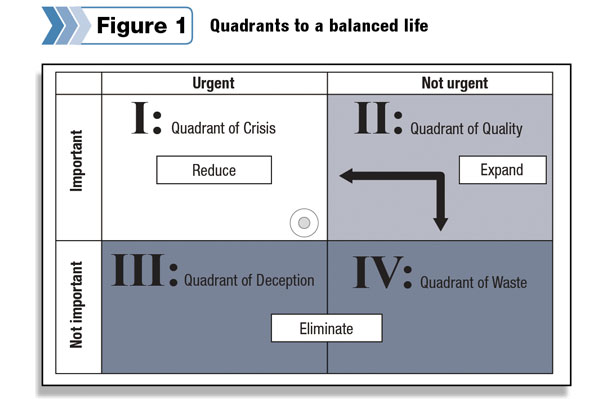Although I certainly did not come home rested after a busy two weeks and a seven-hour time change, I did feel refreshed, reinvigorated and able to take a fresh look at what I was doing.
I realize that not everyone can or should take a two-week vacation; however, I think all of us need to periodically ask the question: Are we working too much?
We begin by considering why we work “too” much. Four possible reasons emerge:
- The beef production business or agribusiness financial status does not enable hiring sufficient labor to enable the manager to work reasonable hours.
- No one else is capable of doing the work I do.
- Time working on the ranch is more urgent even though not more important.
- There is nothing important to do in non-work time.
The fourth is rare, but for those it fits, my response is very simple: “Get a life.” The first is a real challenge, if true.
More commonly, it is an easier justification to oneself and others than reasons 2 and 3.
Those of us who work too much do so because we believe – consciously or subconsciously, intentionally or unintentionally – that we must be present for the necessary work to get done satisfactorily.
We all are trying to work less; unfortunately, trying is not sufficient. One informal definition of insanity is continuing to do the same thing and expecting the results to be different. Think about this definition the next time you “try” to work less.
Consider the following four suggestions.

Make life balance a priority
Stephen Covey (“Seven Habits of Highly Effective People”) popularized a focus on Quadrant II (Figure 1).
Quadrant II includes everything that is important but not currently urgent. This quadrant includes many of the work activities of leadership: management, training, coaching and professional development. It also includes much of your personal and family time.
Success as a leader, manager or supervisor requires expanding the time available for Quadrant II activities. This is accomplished by making these activities a priority and establishing personal operating rules and structures that ensure sufficient Quadrant II time. Remember, time management is not about time; it is about priorities.
Plan for life balance
Bill is struggling with life balance issues resulting from the birth of a first child. He has consistently expressed the need to finish work no later than 5 p.m. several nights a week.
Although his supervisor is supportive, Bill almost never leaves work before 6:00 or 6:30. Why? Bill’s answer is that there are always uncompleted tasks remaining only he can do.
Many of us are like Bill. We work too much because we do not have a plan to do otherwise. Here are my ideas:
- Outline what needs to be done.
- Determine what can reasonably be completed in the time available.
- Complete high-priority tasks only you can do first, even if they are tasks you tend to avoid.
- Delegate tasks to others.
- Become more efficient with your work time.
The final two items are our last two suggestions to improve life balance.
Train others to complete some of your tasks
Several years ago, I listened to a very successful farm manager talk about his success in managing employees. He stated, “Ninety percent of the difficulties with employee performance are a result of something I did or didn’t do.”
Failing to recognize this possibility, managers frequently underestimate the capabilities of their employees.
Let’s try the following. Close your eyes. Stop focusing on the weaknesses of your employees. When you open your eyes, look for the strengths and potential in each of your employees. Based on these strengths and potential:
- Select one task you currently do that one or more of your employees could complete successfully.
- Develop a plan to:
- Create an excitement for the new task in the employee.
- Provide the training required.
- Establish performance expectations.
- Coach and provide feedback including comparing actual and expected performance expectations.
- When this employee is well on his or her way to success, select another task to transfer from your task list.
Not only are you making time for more Quadrant II activates, including personal time, you are enhancing the productivity and, most assuredly, the job satisfaction of your employees.
Enhanced personal efficiency
The demands of graduate study present significant life balance challenges. When I was completing my Ph.D. course work, many in my class had a policy of getting away from our studies on Friday night.
Our hope, usually achieved, was to return refreshed bright and early (well, not early by ranch standards) Saturday morning.
One member of our class, Ron, would invariably be at the office on Friday night. As we were getting back into our studies on Saturday morning, Ron would drag in, tell us how frustrated he was that he “had to study” on Friday night, how little he had accomplished and how little motivation he had to study today.
Do you have “Ron time?” Time when you are burnt out and inefficient; time when you get an “F” in life balance because you are accomplishing little or nothing at work, but you are at work.
Take some time and identify your “Ron time.” Now reschedule your work so you have sufficient personal and family time to avoid being inefficient at work (“Ron time”).
Concluding suggestions
We end with suggested habits to relieve the stress of work and create quality time for yourself, your family and your friends. Try some of the following:
- Schedule time during the day when all family members are together. Talk about the day. Ask each person to share one or two positives from their day – a new friend, an accomplishment, something learned, an exciting experience with an old friend.
- Go for a walk. Don’t look for weeds in the field. Listen to a bird sing, watch a butterfly flit by, marvel at a beautiful flower or the quiet of the countryside.
- Read something you enjoy. You need not spend a long time. A chapter or a few pages a day really adds up. A short period of reading or reflection is very important to many very successful people.

Bob Milligan is also professor emeritus, Dyson School of Applied Economics and Management, Cornell University.

Bob Milligan
Senior Consultant
Dairy Strategies LLC







